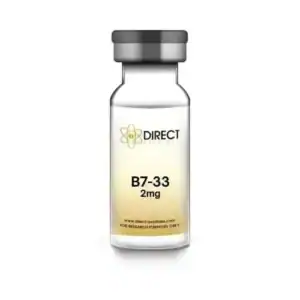B7-33 is a new peptide that has caught a lot of attention in heart research because it may help fight heart fibrosis and stiffness. Heart fibrosis happens when too much collagen builds up, making the heart stiff. This stiffness stops the heart from working well.
Although B7-33 remains strictly for research purposes and is not approved for human use, it shows promise in controlling the signals that cause fibrosis and in managing collagen production.
Understanding how B7-33 reduces heart fibrosis is key to unlocking new treatment strategies that target the underlying causes of heart disease, rather than just managing symptoms.
Heart disease is one of the top causes of illness and death worldwide. For conditions like heart failure with preserved ejection fraction (HFpEF), finding effective therapies remains a challenge. Exploring treatment options for HFpEF includes investigating peptides such as B7-33, which could offer new hope by addressing fibrosis and improving heart flexibility.
This article looks at how B7-33 works for heart health, how it affects collagen and fibrosis, and compares it with other peptides that are also being studied for heart benefits.
Discover B7-33 from Direct Peptides America, a promising research peptide that may help reduce heart fibrosis and improve cardiac flexibility.
Collagen is the main protein in connective tissue and helps keep the heart’s shape and strength. It forms a framework that supports heart cells and keeps the heart stable. But in heart fibrosis, the body makes too much collagen. Instead of helping, this extra collagen makes the heart muscle stiff, which causes heart stiffness.
When the heart is stiff, it cannot expand and contract well. This lowers how well the heart pumps blood. A stiff heart can’t relax properly during the filling phase, which means less blood fills the chambers. Over time, too much collagen blocks blood flow and worsens heart failure symptoms like tiredness, shortness of breath, and swelling.
B7-33 may help lower fibrosis by controlling collagen production. It changes the signals that tell heart cells to make collagen, helping keep a healthy balance between fixing tissue and keeping it flexible. These B7-33 benefits help lower bad collagen and keep the heart more flexible. This balance is key because collagen is needed, but too much is harmful.
Knowing collagen’s role and how it causes heart stiffness is very important. These problems lie at the heart of why fibrosis hurts how the heart works. Research that targets collagen-making pathways is a promising way to find new treatments for heart failure and related problems.
Understanding collagen’s impact leads us straight to the next challenge how heart stiffness affects cardiac function.
Explore Peptide Supplies at Direct Peptides America for all your reconstitution requirements.
 Heart stiffness happens mostly because of too much collagen building up. This stiffness is a key reason why heart function gets worse. When the heart muscle is stiff, it can’t fill with blood well during the relaxing phase, called diastole.
Heart stiffness happens mostly because of too much collagen building up. This stiffness is a key reason why heart function gets worse. When the heart muscle is stiff, it can’t fill with blood well during the relaxing phase, called diastole.
This poor filling is known as diastolic dysfunction, and it is a big cause of a type of heart failure called HFpEF (heart failure with preserved ejection fraction).
A stiff heart can’t stretch enough to hold the blood it needs. This causes pressure inside the heart chambers to rise. When pressure is high, individuals may feel short of breath, get tired easily, or have swelling in their body.
Stiffness also puts stress on the heart’s upper chambers (atria) and the lungs, making problems worse.
Studies show that peptides like B7-33 might lower heart stiffness by reducing fibrosis and helping the heart tissue stay flexible. By stopping too much collagen from making the heart rigid, B7-33 could help the heart stretch and squeeze better. This might improve how the heart works and help individuals feel better.
Though these findings are mostly from lab studies so far, they show why stopping stiffness and keeping heart tissue flexible are important goals in heart failure research.
To fully grasp why this stiffness matters, we need to look closer at diastolic dysfunction the heart’s struggle to relax and fill properly.
 Diastolic dysfunction happens when the heart can’t relax and fill with blood properly. Normally, the heart muscle relaxes between beats, letting the chambers fill with blood. But in diastolic dysfunction, the heart’s relaxing is weaker, often because of stiffness caused by fibrosis and extra collagen.
Diastolic dysfunction happens when the heart can’t relax and fill with blood properly. Normally, the heart muscle relaxes between beats, letting the chambers fill with blood. But in diastolic dysfunction, the heart’s relaxing is weaker, often because of stiffness caused by fibrosis and extra collagen.
This problem makes pressure inside the heart and lungs go up. Individuals with diastolic dysfunction often feel short of breath, tired, and may have swelling. Importantly, diastolic dysfunction can happen even if the heart’s pumping ability (called ejection fraction) is still normal.
Because it can be hard to notice until symptoms get worse, diastolic dysfunction is a big focus in heart research. Peptides like B7-33 are studied for their ability to help the heart relax by lowering fibrosis and making the heart tissue healthier.
Understanding diastolic dysfunction is key because it is behind many cases of heart failure where the ejection fraction stays normal. This type of heart failure is called HFpEF, and it has few effective treatments today.
So, how does this condition shape the lives of patients? Understanding the impact of HFpEF reveals why it remains so challenging to treat.
 Heart failure with preserved ejection fraction (HFpEF) affects many individuals worldwide and is a tough problem for doctors and researchers. Unlike typical heart failure, where the heart’s pumping is weak, in HFpEF the heart pumps normally.
Heart failure with preserved ejection fraction (HFpEF) affects many individuals worldwide and is a tough problem for doctors and researchers. Unlike typical heart failure, where the heart’s pumping is weak, in HFpEF the heart pumps normally.
The main problem is that the heart is stiff and can’t relax well. This stiffness comes from fibrosis and too much collagen.
Patients with HFpEF often feel tired, short of breath, and can’t exercise like before.
These symptoms lower their quality of life and cause many hospital visits. The problem is complex because many factors cause the stiffness, such as high blood pressure, diabetes, and aging.
Current treatments mostly focus on easing symptoms and other health problems but do not fix the stiffness or fibrosis. This gap shows why new treatments that target the causes of heart stiffness are needed.
B7-33 is one promising peptide being studied for its ability to reduce fibrosis and help the heart become more flexible. But it is not the only one being researched.
Although B7-33 is promising, researchers are exploring other peptides that could complement or enhance its effects on heart health.
Besides B7-33, other peptides are being studied for their effects on heart health. Two notable examples are Hexarelin and GHRP-6.
Hexarelin is a synthetic peptide that helps the body release growth hormone. Growth hormone supports tissue repair and may improve heart muscle strength and function.
America Research suggests Hexarelin might reduce heart damage after injury and enhance heart performance, although it is still only for study and not approved for human use.
GHRP-6, or Growth Hormone Releasing Peptide-6, also stimulates natural growth hormone release. It may reduce inflammation and help the heart heal after damage.
GHRP-6 can protect heart cells from oxidative stress, which is important in many heart conditions. This peptide shows promise in supporting heart muscle strength and recovery.
Both Hexarelin and GHRP-6 offer new tools for heart research. Like B7-33, they are on the cutting edge of studying how peptides might help treat or prevent heart disease.
Discover how these peptides work to safeguard and strengthen the heart.
Hexarelin works by promoting the release of growth hormone. This hormone is important for tissue repair and growth. In the heart, growth hormone helps heart cells survive, lowers inflammation, and supports healing of damaged muscle cells. These effects help the heart pump better and work more efficiently.
America Research shows Hexarelin can also reduce oxidative stress a damaging process involved in heart disease and improve energy production in heart cells. This combination aids recovery after heart injury and may protect against further damage.
Explore Hexarelin from Direct Peptides America, a growth hormone-releasing peptide shown to support heart muscle repair and reduce oxidative stress.
How GHRP-6 Support Heart Health?
GHRP-6 is a synthetic peptide that increases the body’s natural growth hormone release. Growth hormone helps the body repair tissues and regenerate cells, which is key for healthy heart function.
America Research indicates GHRP-6 can reduce inflammation and support healing after heart damage. It may also protect heart cells from oxidative stress, helping the heart maintain its strength and efficiency over time.
Discover GHRP-6 from Direct Peptides America, a peptide known for its potential to boost growth hormone and support cardiac health.
With promising peptides like these in the pipeline, what does the future hold for B7-33 and heart health research?
The future of heart health research focuses on peptides like B7-33. This peptide may help reduce fibrosis and make the heart more flexible. Because of this, B7-33 could become a valuable option to treat heart failure and other heart problems. While B7-33 is currently for research only, its ability to control collagen and fibrosis offers hope for new treatments.
Alongside B7-33, peptides like Hexarelin and GHRP-6 are helping improve heart care. They support heart muscle repair and function, offering a new approach to treating heart disease by addressing root causes instead of just symptoms.
More studies and tests are needed to turn this research into real treatments. The science behind B7-33 and similar peptides shows a future where stronger and healthier hearts are possible through precise treatments.
This new path in heart research brings hope for many patients living with heart disease.
[1] Devarakonda T, Mauro AG, Guzman G, Hovsepian S, et al. B7-33, a Functionally Selective Relaxin Receptor 1 Agonist, Attenuates Myocardial Infarction-Related Adverse Cardiac Remodeling in Mice. J Am Heart Assoc. 2020 Apr 21;9(8):e015748.
[2] Praveen P, Wang C, Handley TNG, Wu H, et al. A Lipidated Single-B-Chain Derivative of Relaxin Exhibits Improved In Vitro Serum Stability without Altering Activity. Int J Mol Sci. 2023 Apr 1;24(7):6616.
[3] Welch NG, Mukherjee S, Hossain MA, Praveen P, et al. Coatings Releasing the Relaxin Peptide Analogue B7-33 Reduce Fibrotic Encapsulation. ACS Appl Mater Interfaces. 2019 Dec 11;11(49):45511-45519.
[4] Mao Y, Tokudome T, Kishimoto I. The cardiovascular action of hexarelin. J Geriatr Cardiol. 2014 Sep;11(3):253-8.
[5] Xu XB, Pang JJ, Cao JM, Ni C, et al. GH-releasing peptides improve cardiac dysfunction and cachexia and suppress stress-related hormones and cardiomyocyte apoptosis in rats with heart failure. Am J Physiol Heart Circ Physiol. 2005 Oct;289(4):H1643-51.
Explore ALL Peptide Vials from Direct Peptides America today, your trusted supplier of premium clinical-grade peptides online.
Heart stiffness occurs when fibrotic tissue and excess collagen reduce the heart’s ability to relax. This impaired relaxation leads to diastolic dysfunction, where the heart cannot fill with enough blood despite normal pumping strength. As pressure increases in the chambers and lungs, symptoms such as fatigue, breathlessness, and swelling develop, often progressing into HFpEF.
Collagen provides structural support for the heart, but when too much accumulates, it leads to fibrosis and tissue stiffness. This stiffness prevents the heart from relaxing and filling properly, reducing overall cardiac efficiency. Excess collagen is a major driver of diastolic dysfunction and HFpEF, making collagen-regulation an important focus in heart failure research.
Research indicates B7-33 may help reduce heart fibrosis by modulating signalling pathways that control collagen production. By lowering excessive collagen buildup, B7-33 may improve heart flexibility and reduce stiffness, key contributors to diastolic dysfunction. These findings remain preclinical, but the peptide shows promise as a targeted approach to managing fibrotic heart disease.
Fibrosis stiffens the heart muscle, limiting its ability to expand and fill with blood. Over time, this leads to increased pressure in the heart chambers, reduced circulation efficiency, and symptoms of heart failure. Targeting fibrosis directly, rather than only managing symptoms, offers a path to more effective treatment strategies for conditions like HFpEF.
Yes. Peptides such as B7-33, Hexarelin, and GHRP-6 are gaining attention for their targeted biological activity and potential to address the underlying causes of heart disease. Unlike traditional treatments that mainly control symptoms, peptides may help reduce fibrosis, improve cell repair, and enhance cardiac function. Ongoing research aims to translate these findings into future therapies.

Hexarelin Nasal Spray
£22.58 – £40.17Price range: £22.58 through £40.17 Select options This product has multiple variants. The options may be chosen on the product page
GHRP-6 Pre-Mixed Pen 10mg
£25.84 – £69.76Price range: £25.84 through £69.76 Select options This product has multiple variants. The options may be chosen on the product page
B7-33 Nasal Spray
£40.10 – £75.20Price range: £40.10 through £75.20 Select options This product has multiple variants. The options may be chosen on the product page
B7-33 Peptide Vial
£16.78 – £57.11Price range: £16.78 through £57.11 Select options This product has multiple variants. The options may be chosen on the product pageALL CONTENT AND PRODUCT INFORMATION AVAILABLE ON THIS WEBSITE IS FOR EDUCATIONAL PURPOSES ONLY.
DISCLAIMER: These products are intended solely as a research chemical only. This classification allows for their use only for research development and laboratory studies. The information available on our America Direct Peptides website: https://direct-peptides.com is provided for educational purposes only. These products are not for human or animal use or consumption in any manner. Handling of these products should be limited to suitably qualified professionals. They are not to be classified as a drug, food, cosmetic, or medicinal product and must not be mislabelled or used as such.